Kagame's Killing Fields is the latest book by author David Himbara. This book follows Kagame's Economic Mirage published by same author in 2016. The two books share one main thing - they are both based on hard evidence drawn from official governmental or multilateral agencies' records. As Himbara explains in the two books, it is his strategy to avoid anecdotal materials which are easily disputed.
Kagame's Killing Fields is a shocking account of killings in Rwanda, DRC, and beyond - all unleashed by Kagame from 1994 to 2016. Ironically, Himbara's data on Kagame's Killing Fields is mostly from The United States' government - a country that has been most supportive of the Kagame regime. Perhaps what will shock people who read Kagame's Killing Fields is the chapter on the Rwandan genocide in 1994. Himbara paints a picture that is sharply different from the official Rwandan view. Himbara heavily quotes Kagame and his party, the Rwandan Patriotic Front (RPF) in their vehement opposition to the UN intervention to stop genocide, after the initial UN withdrawal instigated by the Clinton Administration in the US. According to Himbara, Kagame was interested in power as opposed to saving lives. External intervention would have denied him outright power - such intervention would have led to power-sharing.
The book is most depressing on what followed in the RPF takeover in 1994, the massacres in Rwanda such as Kibeho in 1995, through the invasion of Congo, and the subsequent deaths of up 5 million in that country between 1996 and 2000.
This book is a must read for everyone interested in human rights, international law, and political studies. It is an eye opener - and for those who see Kagame as a saviour. On the contrary, he is a monster, as Himbara ably demonstrates. The book should shame Kagame's diehard supporters such Bill Clinton and Tony Blair. It is hard to imagine that they have no idea of who Kagame truly is.
Showing posts with label DAVID HIMBARA. Show all posts
Showing posts with label DAVID HIMBARA. Show all posts
Monday, 24 July 2017
Tuesday, 4 April 2017
Mounting evidence Rwandan President ordered killing of dissidents
"Three months ago, President Kagame's personal doctor was shot in a police cell. Killed. Gustave Makonene, this is the coordinator of Transparency International. Strangled. Kagame's personal driver. Killed. The Canadian government itself monitors me and other colleagues because we are not safe." - David Himbara testimony at a U.S. Congressional Sub-Committee
David Himbara is a Rwandan dissident, and a Canadian citizen. He was once a close advisor to Rwanda's president, Paul Kagame. But his words -- together with those of others -- paint a picture of Mr. Kagame's increasingly authoritarian rule.... both inside his borders, and out.
There is mounting evidence that president Kagame has ordered the assassinations of Rwandan dissidents, at home and abroad. At least half-a-dozen Rwandan dissidents have been attacked, or have died under suspicious circumstances, over the last five years.
On New Year's Eve, 2013, Rwanda's former intelligence chief Patrick Karegeya was found strangled to death in his hotel room in Johannesburg, South Africa.
David Himbara was living in Johannesburg at the time, but visiting Canada. When he learned of Patrick Karegeya's death, he decided to stay here. The former presidential advisor lives in Toronto now, and David Himbara joined us in studio.
We contacted the Rwandan High Commission in Ottawa about this story and asked for an interview or a statement. We did not receive either. In the past, the Rwandan government has denied any involvement in attacks on dissidents.
Some of the most damning evidence of President Kagame's complicity in the attacks on Rwandan dissidents has been turned up by Canadian journalists. The Globe and Mail's Geoffrey York, together with Montreal-based freelance writer Judi Rever, have worked together on a months-long investigation into this story.
Geoffrey York is the Globe and Mail's Africa Bureau Chief. He was in Johannesburg.
This segment was produced by The Current's Gord Westmacott.
Biography of David Himbara
David Himbara is an educator, author, professor of international development, and solar energy activist based at Centennial College, Toronto, Canada. Himbara is Laureate of the Victoire Ingabire Umuhoza Prize for Democracy and Peace, 2017.
Previously, Himbara has taught at several universities in North America and Africa including the University of Witwatersrand’s Graduate School of Public and Development Management in South Africa from 2010 to 2013. While there, Himbara led a team that succeeded in bringing the World Bank’s Centre for Learning on Evaluation and Results (CLEAR) to the university, where the program supports governmental clients throughout sub-Saharan Africa.
In 2011, Himbara served as a lead consultant for the African Development Bank in Tunisia in 2011, and in 2010, he served as chief strategist for the UN Development Programme (UNDP) in South Africa. In addition, between 2011 and 2013, Himbara worked as a lead consultant at the Central University of Technology in Bloemfontein, South Africa.
A Rwandan-Canadian, Himbara spent a total of six years working for Rwanda’s President Paul Kagame: from 2006 to 2009 as the head of strategy and policy in the Office of the President and from 2000 to 2002 as the principal private secretary to the president. From 2002 to 2006, Himbara worked in South Africa, where, among other projects, he was the lead consultant for teams that conducted the country’s Ten Year Development Review. Concurrently, he was the lead strategist on a joint Development Bank of South Africa-University of Witwatersrand’s Knowledge Management Africa.
Himbara returned to Rwanda in 2006 after President Kagame offered him a leading role focused on socioeconomic development. Tasked with improving national competitiveness, Himbara spearheaded efforts that ultimately improved Rwanda’s ranking in the World Bank’s annual Doing Business report from 143rd to 67th out of 183 countries; Rwanda was named top reformer by the World Bank’s Doing Business Report, 2010. In this phase, Himbara set up and headed the Strategy and Policy Unit, Office of The President. In this capacity, he led the establishment of the Rwanda Development Board (RDB) and was its founding Chairperson. He also led the setting up of the Institute for Policy Analysis and Research (IPAR), and became its founding chairperson. In addition, Himbara was the chairperson of the World Bank-funded Human and Institutional Development Agency (HIDA).
Prior to his time in Rwanda, Himbara was based in South Africa working as a private consultant; major assignments included lead consultancy on trade and investment harmonization for the Southern African Community and lead strategist on Indonesian export policy into South Africa. He also lectured on economic development as a senior lecturer at the University of Witwatersrand from 1994 to 1997 and was an assistant professor at Southern University in Louisiana, USA, from 1991 to 1993.
Himbara completed his PhD in political economy at Queen’s University in Kingston, Ontario, Canada, in 1991. He is widely published on social and economic development in leading journals and online. Himbara’s dissertation on the role of domestic entrepreneurs and the state in socioeconomic transformation was published as a book in 1994: Kenyan Capitalists, the State, and Development. His most recent book, Kagame’s Economic Mirage, was published in 2016.
Thursday, 23 March 2017
The World Bank’s Dual Messages To Kagame – “We Love Your Drones, But Your Energy Indicators Are Disastrous”
 |
| The World Bank President Jim Yong Kim launching Kagame’s blood delivery drone 21 March 2017 |
On a visit to Rwanda on March 21, 2017, the World Bank President Jim Yong Kim was impressed by President Paul Kagame’s drones that purportedly deliver blood across Rwanda. I wonder if Jim Yong Kim discussed with Kagame how much blood the drones have delivered so far. Or how the blood is handled on arrival in a country of nearly 12 million but with less than 700 medical doctors. Or if there is electricity and refrigeration facilities in rural Rwanda to preserve the blood.
Meanwhile, the World Bank has come up with Regulatory Indicators For Sustainable Energy (RISE). RISE is based on a vast of primary policy and regulatory documents and is published biannually – the next one being due in 2018. The inaugural 2016 RISE Report covers 111 countries across the developed and developing world.
RISE has three pillars – but I limit my comments here to Pillar 1, which assesses policies relating to energy access. In this pillar on energy access, RISE scrutinizes the following national policies and regulations:
- “Existence and monitoring of officially approved electrification plan.
- Scope of officially approved electrification plan.
- Framework for grid electrification.
- Framework for minigrids
- Framework for stand-alone systems.
- Consumer affordability of electricity.
- Utility transparency and monitoring.
- Utility creditworthiness.”
So how does the World Bank score Rwanda on Pillar 1? Rwanda’s score out of 100 points is the lowest in East Africa:
- Kenya – 82
- Uganda – 78
- Tanzania – 75
- Burundi – 45
- Rwanda – 41
Dear President Jim Yong Kim, please tell your pupil President Paul Kagame to shape up. Remind him that energy is the cornerstone of every country’s development – not gimmicks like drones.
Friday, 17 March 2017
How Churches Could Lead The Energy Revolution In Sub-Saharan Africa – By Anchoring Community Solar Gardens
THE CHALLENGE
A startling percentage of the Sub-Saharan Africa (SSA) population does not have electricity – 620 million out of 1 billion people. Add another 100 million and you get the number of people in SSA who cook with firewood that is depleting forest cover. Meanwhile, solar energy is increasingly becoming a solution on other continents – but not nearly as widespread in Africa. The continent lags far behind the developing world in the uptake of solar energy due to three factors: 1) innovative public policy is not robust; 2) not enough private sector champions; 3) African masses cannot afford the up-front solar installation costs.
But these barriers should not and will not keen Sub-Saharan Africa from cashing in on solar that is taking the rest of the world by storm. This is where community shared solar energy comes in.
THE POTENTIAL SOLUTION – COMMUNITY SOLAR
Community solar is the banding of neighbours, together with a local church, a business or school, to set up a solar power plant into which everyone buys, and reaps the benefits from. ‘Community solar’ takes two forms. First, it refers to a community-owned solar project. Third party-owned solar projects whose electricity is shared by a community is the second form. These forms of broadening access to solar energy are becoming more and more popular.
As can be seen from the above brief discussion, one of the several primary purposes of a community solar is to enable members to share the benefits of solar power even if they cannot individually afford to install solar panels. Equally crucial is the fact that the participants benefit from the electricity generated by the community solar farm/garden which costs far less than what they would ordinarily pay for on-grid electricity.

In the United States alone, the next “five years will see the U.S. community solar market add an impressive 1.8 gigawatts, compared to just 66 megawatts through the end of 2014.”
THE CHURCH AS ANCHOR TO THE SOLAR REVOLUTION IN SUB-SAHARAN AFRICA
Why might the church be a natural anchor in spreading community solar across Sub-Saharan Africa?
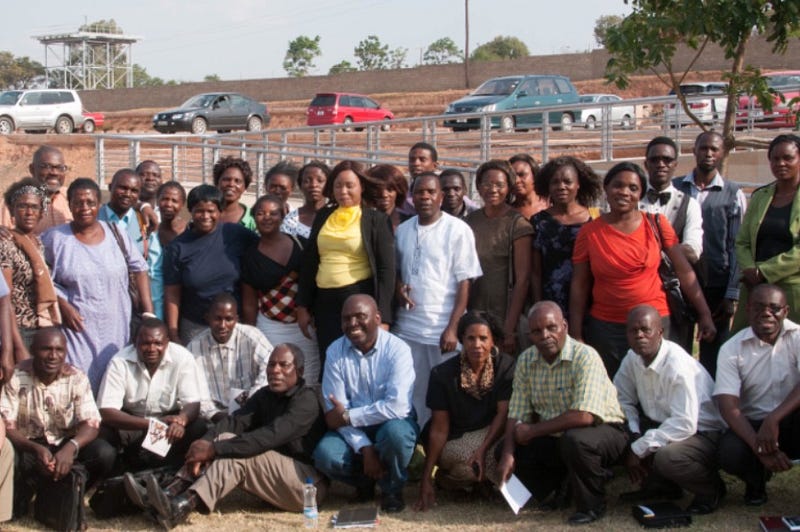 A church meeting in Zambia
A church meeting in Zambia
There are at seven reasons why the church is the best equipped organization to mobilize communities for up-taking shared solar energy in Africa:
- The church is where most people go for council, self reflection, and community solidarity;
- The church is a community meeting place, in which the church is regarded as a neutral referee, mediator, and reconciler.
- The church is a proven community-mobilizing institution for solutions;
- The church is influential with leaders from government, business, and civil society;
- There is a church in African village;
- There is usually a school attached to the church;
- The church itself needs electricity, as does the affiliated school.
Shared community solar, as noted, define various energy arrangements that allow communities to share the benefits of a local energy power plant. This way, pooled investments from multiple members provide energy that would otherwise be beyond the reach of individuals. What we urgently need in Sub-Saharan Africa are champions for community solar – the church may very well play this role.
___
David Himbara
___
David Himbara
Wednesday, 8 March 2017
The World Will Sooner Or Later Discover We Are Killers, Liars, And Corrupt – Kagame
Unknown
06:18:00
BIHIBINDI, BIHIBINDI NEWS, DAVID HIMBARA, FPR - KAGAME KILLINGS, LATEST, PAUL KAGAME, RWANDA, RWANDA NEWS
In an extraordinary speech delivered at the end of the 2017 National Leadership Retreat, Rwanda president, Paul Kagame was merciless with his words. Not merciless towards his real or perceived political enemies but towards his own government. Kagame said that sooner or later, the world will see the lies his government has been spreading about security, and socioeconomic development. In Kagame’s own words:
“You can not keep telling lies and get away with it…When you say you eradicated poverty, it will find you on your doorsteps and you have nowhere to hide…Our ambassadors spread stories in Japan, China, Europe and America that we are in Rwanda enjoying peace and security to the fullest. But when these people visit Rwanda, they read that people are scared of going out at night because their chances of getting to their destination is 50%; they may disappear or get killed…”
According to the Rwandan president, the world will soon discover that:
- People are killed or simply disappear in Rwanda – and yet the government is always boasting of high security in the country.
- Hunger is ravaging Rwanda – and yet the government boasts of improved conditions in the country.
- Poverty claims lives prematurely – people barely live beyond 40 years, but yet government boasts of prosperity.
- Hospitals are without doctors – yet the government boasts of improved health for all Rwandans.
- Corruption is rampant – yet the government boasts being clean but by comparing with more corrupt neighbouring countries.

The Rwandan leaders listening to Kagame appeared lost and confused – because the president is the boaster-in-chief. He barely lives in Rwanda – travelling around the world telling the very lies he is now disclaiming.
Even Kagame’s sycophants must realize what we all know – Rwanda is trapped with a leader who simply will never take responsibility for his own failures. Here is a man who is openly conceding that his regime kills people, lies about development achievements, and is corrupt – but is preparing to grab power for the next 17 years, after ruling for 23 years.
________
David Himbara
Two Brave Women Who “Got Tired Of Giving In” – Meet Rosa Parks And Diane Rwigara
Unknown
06:07:00
BIHIBINDI, BIHIBINDI NEWS, DAVID HIMBARA, DIANE RWIGARA, FPR - KAGAME KILLINGS, KIGALI, LATEST, PAUL KAGAME, RWANDA
The two women lived in different times. One passed away on October 24, 2005. The other is in her prime. They lived in different countries. One lived in America. The other lives in Rwanda. But they both acted in the same way when they reached a tipping point – they got “tired of giving in.”
Meet Rosa Parks and Diane Rwigara.
In December 1955, Parks refused to obey racist laws in America. Her defiance became an important catalyst of the Civil Rights Movement. Parks soon became an international icon of resistance to racial segregation in her country – she simply “got tired of giving in” to injustice and repression.
What gave Parks the courage to stand up for her rights when most feared the brute force of the state? This is how Parks explained it:
“You must never be fearful about what you are doing when it is right.”Fast forward to February 2017. A young Rwandan woman named Diane Rwigara, too, got tired of giving in to a repressive state of her country, Rwanda. While most Rwandans hide under their beds rather than confront the Rwanda regime that has beaten them into submission, Rwigara stood up and said no. And she said no to several characteristics of the repressive regime in Rwanda including:
- No to the hunger that is ravaging Rwanda while the country’s rulers live like kings.
- No to mysterious disappearances of innocent Rwandans whose crime is to exercise their basic human rights.
- No to wealth concentrated in a tiny ruling elite while the rest live in dire poverty and unemployment, especially the youth.
- No to the so-called “development” of buildings designed to impress visitors while children go hungry.
- No to the arrogance of the powerful that are unaccountable to the people who pay them salaries – taxpayers.
- No to crony capitalism that is not based on real private sector but the grabbing of other people’s businesses and properties.
Diane Rwigara, by “getting tired of giving in” you are the Rosa Parks of Rwanda. May your act of defiance lead to the same results as that of Rosa Parks. May your defiance become an important catalyst for freedom from dictatorship. May you become an icon of resistance to injustice in Rwanda.
_____
David Himbara
Kagame Is Back In The Air – Headed For Harvard University On March 10, 2017

After spending a couple of weeks in Rwanda, following his global tours that took him to Asia, Africa, and Europe in a two months period, Kagame is back in the air.
This time he is headed for Harvard University – a school he frequents. U.S. elite universities worship the Rwandan ruler, especially Harvard. The university is rolling out the red carpet once again. Kagame was there last year. His talk this time is advertised as “A conversation with His Excellency Paul Kagame,” scheduled for Friday, March 10, 2017, at 4:50 PM. The venue is NYE ABC, Taubman Building.
More critically minded faculty and students should ask Kagame real questions. They should also acknowledge his recent and rare truthfulness. In his concluding remarks at the National Leadership Retreat on March 2, 2017, Kagame painted Rwanda in its true colours. Rejecting the usual exaggerated accounts of Rwanda’s achievements under his rule, Kagame bluntly informed his government:
“You cannot keep telling lies and get away with it…When you say you eradicated poverty, it will find you on your doorsteps and you have nowhere to hide…Our ambassadors spread stories in Japan, China, Europe and America that we are in Rwanda enjoying peace and security to the fullest. But when these people visit Rwanda, they read that people are scared of going out at night because their chances of getting to their destination is 50%; they may disappear or get killed…”
Members of the Harvard University community should ask this man why he is seeking a new term with such a disastrous record – after 23 years in power.
____
David Himbara
Wednesday, 1 March 2017
@DavidHimbara : What Is The Purpose of Rwanda’s Annual Leadership Retreat – Reflection or Public Humiliation?
Unknown
20:41:00
AFRICA, AFRICAN, CORRUPTION, DAVID HIMBARA, DEMOCRACY IN RWANDA NOW, LATEST, PAUL KAGAME
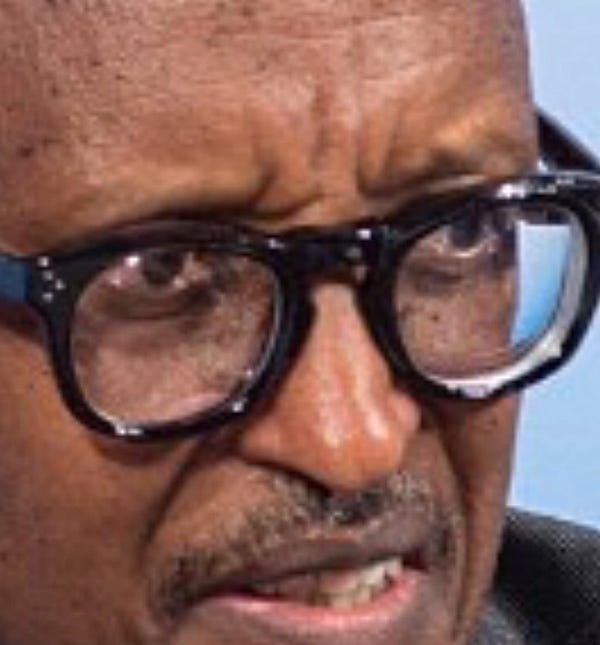
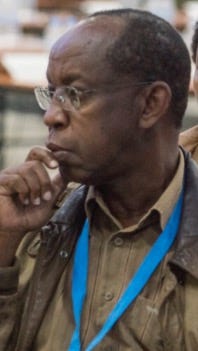
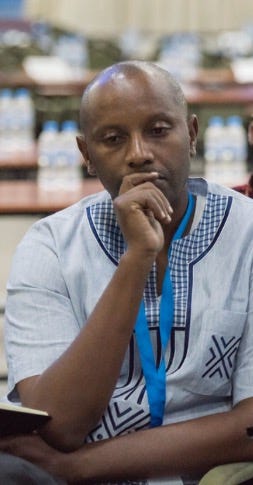
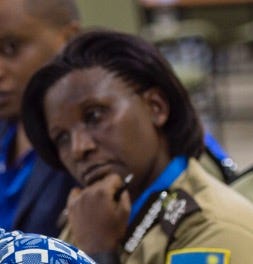
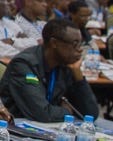
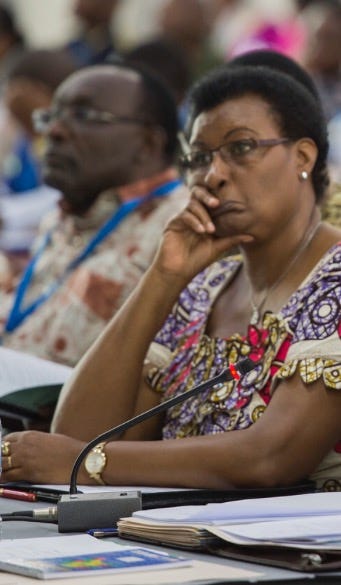
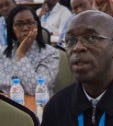
Looking at the images of the 2017 National Leadership Retreat, one might mistake Kagame for an obituary announcer, and leaders listening to him as mourners. It is a gloomy and fearful occasion. It is therefore a legitimate question – what is the purpose of the National Leadership Retreat in Rwanda? This Retreat is unlike similar exercises. Normally, Retreats enable leaders, executives and other stakeholders to improve performance and delivery of services. In particular, leadership retreats provide space to do at least four things:
- Engage minds to reflect on past performance and to fine-tune future policy execution.
- Recognize unproductive patterns, both within leadership and in workplace interactions in order to adjust for improved performance and delivery.
- Initiate change by connecting fully with those in charge of oversight and sector programs.
- Respond to opportunities and challenges for better results.
Rwanda’s Leadership Retreat has little in common with such exercises. Kagame uses the Retreat to exert his power and position to make other leaders feel insignificant. Worse – Kagame declares Rwandan leaders useless. The abuse has now become a ritual.
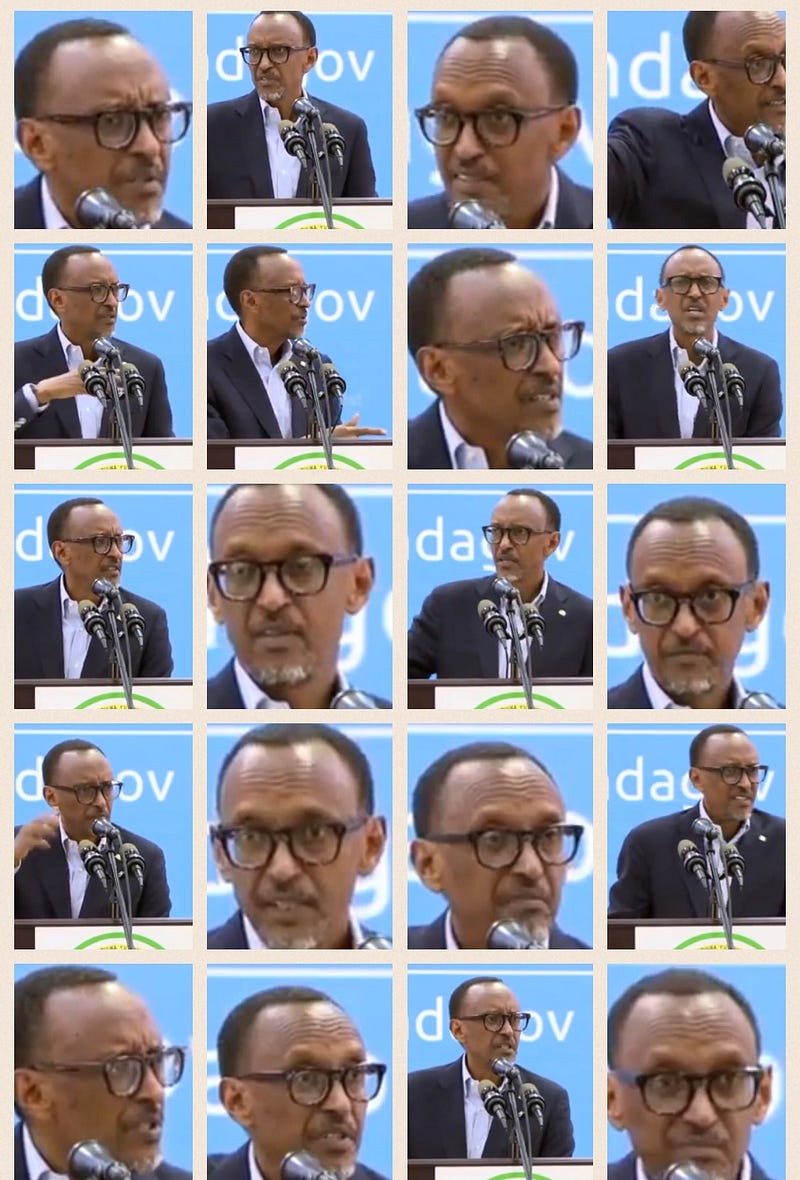
Who does Kagame humiliate? Rwanda’s National Leadership Retreat is attended by government officials including President Paul Kagame, Chief Justice, President of the Senate, Speaker of Parliament, Prime Minister, Cabinet Ministers and other senior officials. The gathering also includes military chiefs, business leaders, and heads of civil society organizations.
In a style of old-school totalitarian headmaster, Kagame reduces the entire Rwandan leadership to inept and even corrupt people. This is precisely how Kagame just described Rwandan leadership at the 2017 Retreat.
Perhaps the 2015 Leadership Retreat was the worst in this regard. Shockingly, the President stated:
“Everybody has become like the other – the killers of yesterday and the liberators of yesterday…full of self-importance and doing nothing for this country that has suffered so much.”
According to Kagame, he is the only one left to save Rwanda as he put it in 2015. Were it possible he would even “take arms and fight” against the current non-performing and corrupt system.
In most bizarre moment of the 2015 Leadership retreat, the Ugandan journalist Andrew Mwenda who doubles as Kagame advisor, tried to rescue Rwandan leaders from Kagame by listing all the good things that Rwanda has supposedly achieved. Mwenda extraordinarily claimed that Rwanda has a better healthcare system than even the united States of America.
Kagame then turned on Mwenda:
“I really don’t like your comments. You can reserve them for your Independent newspaper. You write them and I will read them there.”
Fast forward to 2017. Kagame has once repeated the ritual, terming the Rwandan leaders zombies who come to the retreat only to leave and repeat same motions – incompetence and no delivery.
Kagame seems to forget four factors:
- He is the builder of the current system since 1994.
- He is the appointing authority of all the officials he is now cursing.
- He is their chief executive officer; chief operational officer, and chief financial officer.
- He has used the same people he is abusing to grab power – he is set to rule until 2034 and possibly beyond.
By characterizing the Rwandan system as incompetent and corrupt, Kagame is conceding that he is a total failure. He is, after all, the architect of the system.
___
David Himbara
David Himbara
Wednesday, 4 January 2017
The New Times Of Rwanda - You Are A Hypocrite
Unknown
11:04:00
BIHIBINDI, BIHIBINDI NEWS, DAVID HIMBARA, HYPOCRITE, LATEST, NEWS PAPER, RWANDA, THE NEW TIMES OF RWANDA
Dear The New Times, allow me to first quote the Bible before letting you know what I wish to share with you and your readers. Mind you I hardly command deep knowledge of the Bible but my religious friends and relatives often share verses that send powerful and persuasive messages. Case in point is the following:
◄ Luke 6:42 ►
"How can you say to your brother, 'Brother, let me take the speck out of your eye,' when you yourself fail to see the plank in your own eye? You hypocrite, first take the plank out of your eye, and then you will see clearly to remove the speck from your brother's eye."
Dear The New Times, two days ago you published an essay on how the United Kingdom blocked the United Nations' intervention to stop genocide in Rwanda. Yes indeed, the UK together the US played despicable roles in the Rwandan genocide.
But my dear The New Times, just like in the above passage in the Bible, before you take the speck out of the British government eye, why not take the plank out of the Rwandan government eye?
This is what the Rwandese Patriotic Front was telling the same United Nations in April 1994:
---------------------
"The Rwandese Patriotic Front regards the proposed U.N. intervention as deliberate attempt to manipulate the U.N. process and machinery to protect and support the murderers who constitute the provisional government.
Consequently, the Rwandese Patriotic Front hereby declare that it is categorically opposed to the proposed U.N. intervention force and will not under any circumstances cooperate in its setting and operation.
In the view of the foregoing the Rwandese Patriotic Front:
a. Calls upon the U.N. Security Council not to authorize the deployment of the proposed force as the U.N. intervention at this stage can no longer serve any useful purpose as far as stopping the massacres is concerned..."
-----------------------
And so The New Times, what is this - from your masters and owners, head of state Paul Kagame and his Rwandese Patriotic Front. Are you not a hypocrite - criticizing easy targets that are thousands of kilometres away while ignoring the elephant in the room?
By David Himbara.
Tuesday, 1 November 2016
How The King Of Rwanda Became A Driver For The King Of Morocco
Unknown
09:45:00
AFRICA, AFRICAN, AMAKURU, BIHIBINDI, BIHIBINDI NEWS, BIHIBINDI NEWS CHILD SOLDIERS, DAVID HIMBARA, MOROCCO, PAUL KAGAME
 |
| How The King Of Rwanda Became A Driver For The King Of Morocco |
The answer is - power and money. Morocco's King Mohammed VI has a lot of cash. Forbes calculated his wealth to be US$5.7 billion, which makes the Moroccan King the 6th richest billionaire in Africa.
Evidently, Morocco is keen to rejoin the African Union, having quit the Organization of African Unity in the 1980s. The Moroccans seem to have settled on Kagame as their frontman in Africa. Kagame has in other words sold Rwanda to another rich buyer in which he gets a cut.
Why do I say that?
Look at these intriguing events between since June 2016:
* June 20, 2016, the Moroccan king decorated Kagame with the Grand Collar of Wissam Al-Mohammadi, Morocco's highest national award of honour.
* October 18-20, 2016, the Moroccan king made a state visit and promised to invest in Rwanda, and to finance Mrs Jeannette Kagame Nyiramongi's Imbuto Foundation.
At the end of his state visit to Rwanda, the Moroccan king was driven to the airport by Kagame himself. There he was - driver Kagame shamelessly becoming an errand boy for another head of state. When Kagame smells money, he will do whatever it takes to have it, no matter how crude and distasteful.
Little wonder that the Moroccan have now become Kagame spokesmen even involving themselves in internal Rwanda politics.
October 28, 2016, Ahmed Charai, publisher of the Moroccan weekly news magazine L'Observateur, published in Huffington Post "Let Kagame Have a Third Term as President."
The Moroccans apparently wish to keep their Rwandan driver in power indefinitely.
_____
David Himbara
Tuesday, 11 October 2016
Mysterious Deaths, Bad Statistics & Showdown With France - Latest From The Kagame Republic
Unknown
12:10:00
AFRICA, AFRICAN, AFRICAN UNION, AGNES BINANGWAHO, AMAHORIWACU 2017 CAMPAIGN, BIHIBINDI, BIHIBINDI NEWS, BIHIBINDI NEWS CHILD SOLDIERS, BLACK HISTORY, DAVID HIMBARA, PAUL KAGAME
In the past two weeks, two perfectly healthy Rwandans died mysteriously in Kagame's republic. First to perish was Senator Jean de Dieu Mucyo. Mucyo died on October 3, 2016, reportedly after "falling down the stairs" at Parliament.
Then today (October 10), we learnt that businessman Vénuste Rwabukamba also mysteriously died after "shooting himself".
Meanwhile new statistics on Rwanda are equally gloomy. Data from the National Bank of Rwanda (BNR) paint the following picture of Rwanda's external trade in first half of 2016:
* Imports - US$1.3 billion;
* Exports - US$325 million;
This disastrous trade imbalance explains why the currency is falling - trading at US$1 = Rwf830.
From the World Bank, we learn that foreign investment into East Africa in 2015 was as follows:
* US$323 million into Rwanda;
* US$1 billion in Uganda;
* US$1.4 billion to Kenya;
* US$1.9 billion for Tanzania.
And then Kagame had a word for France, which has apparently reopened its investigation into the events leading to Rwanda's genocide. Said Kagame:
"If starting all over again is a showdown we will have a showdown, there is no problem about that."
Kagame's republic remains synonymous with mysterious deaths, bad statistics, and showdowns.
____
David Himbara
Wednesday, 21 September 2016
Give Kagame A Hollywood Medal - This Man Is A Great Actor
Unknown
10:53:00
BIHIBINDI, BIHIBINDI NEWS, DAVID HIMBARA, DEMOCRACY IN RWANDA NOW, FPR-INKOTANYI, LATEST, PAUL KAGAME, YALE
 |
| Give Kagame A Hollywood Medal |
Kagame on the world stage giving a lecture at Yale on September 20, 2016, was spectacular. The man appears sophisticated, and argues passionately about Rwanda, which, according to him, is a model nation being frustrated by the West. Because of its arrogance, the West dictates that every country must follow same political norms dictated by the powerful - says Kagame.
During his Yale lecture, Kagame dished out his standard line that the West makes unfair "assumptions" and has prejudices against not only Rwandans but Africans. Kagame defines this Western "moral superiority."
When questioned about his human rights record, Kagame would have none of it - he instead reminded the audience of the economic gains he has made since genocide. In other words Kagame's "Singapore of Africa."
This is great acting. Kagame deserves an Oscar Award from Hollywood. To his naive Yale University hosts, Kagame is convincing in his role and accurately portrays elements of an African statesman who has singlehandedly rebuilt the nation of Rwanda. In front of Yale cameras and a largely unsuspecting audience, Kagame demonstrates masterly acting skills.
As I look at this first rate performance at Yale University, I can't help wonder what would happen, if the same audience listened to a Kagame speech in Kigali, delivered in the same month on September 12, 2016. Addressing university students, Kagame made his infamous "I Will Kill You" remarks. These were his words:
"Those noise-makers you hear all the time, those people who want to mess with us and undermine what we have built. I will kill you. I am not one of those people who are shy about killing. Not me. I will finish you. Those who make noise. I let them do so. But should they cross a line in the sand, you won't know what hit you."
The man speaking in Kigali was the real Kagame - using the thuggish language with which he has terrorized Rwandans into total submission. The Kagame speaking at Yale University was a make believe.
____
David Himbara
Wednesday, 7 September 2016
The Last Prince Left Standing In King Paul's Court - James Musoni
Unknown
13:15:00
AGNES BINANGWAHO, BIHIBINDI, BIHIBINDI NEWS, DAVID HIMBARA, EUGÈNE-RICHARD GASANA, JAMES MUSONI, JEANNETTE NYIRAMONGI KAGAME, LATEST, PAUL KAGAME, RWANDA, RWANDA NEWS
 |
| The Last Prince Left Standing In King Paul's Court - James Musoni |
Here is Musoni's Bio:
- Minister of Infrastructure (2014 - present);
- Minister of Local Government (2009-2014);
- Minister of Finance and Economic Planning (2006-2009);
- Minister of Commerce, Industry, Investment Promotion, Tourism and Cooperatives (2005-2006);
- Commissioner General of Rwanda Revenue Authority (2001-2005) and
- Deputy Commissioner General of Rwanda Revenue Authority (2000-2001).
Part of the explanation for Musoni's survival is that he is the real CEO of Crystal Ventures, Kagame's money machine. Musoni is also the real boss of RPF, Kagame's political machine.
But in a crony system where it is "person eat person" as we see with the fall of Eugene Gasana and Agnes Binangwaho, every crony sooner or later, falls!
Will the last man standing fall, too? Watch the drama unfold.
______
David Himbara
Kagame Is Left With Four Godfathers - Preacher Rick Warren Jumped Ship
Unknown
13:04:00
BIHIBINDI, BIHIBINDI NEWS, BILL CLINTON, DAVID HIMBARA, GODFATHERS, HOWARD BUFFER, LATEST, PAUL KAGAME, RICK WARREN, RWANDA, SENATOR JIM INHOFE, TONY BLAIR, UK, USA
 |
| Kagame Is Left With Four Godfathers - Preacher Rick Warren Jumped Ship |
Five American and British highly influential personalities constitute Kagame's most diehard supporters - Bill Clinton, Senator Jim Inhofe, Tony Blair, Howard Buffet, and Rick Warren.
But it has come to light that Kagame is left with four godfathers - the American preacher Rick Warren has jumped ship. Events in 2015 initially hinted the split. The August 2015 conference in which Warren was to showcase Rwanda’s development achievements failed to take off. Warren had justified the August 2015 Rwanda Conference as follows:
"most nations are validated by their strength in exports; Rwanda can become famous for exporting leadership…Rwanda should be the leadership and innovation capital of the continent of Africa. That is why I am calling leaders from across the continent to come to Rwanda next year to learn. The strength of Rwanda is not in the ground; it’s in the people.”
The conference never happened. Further, Rick Warren was a no show in Rwanda on February 20, 2016 at the annual prayer breakfast he normally attends.
Fast-forward to September 4, 2016. This is the day a Rwandan bishop, Alex Birindabagabo, dropped a bombshell.
Birindangabo, who is the local representative of Warren's Peace Plan, thanked God that he (Warren) is no longer showing up in Rwanda. In an interview in Igihe.com* Birindangabo further asserted that whenever Warren comes to Rwanda he takes credit for everything - even though he (Warren) no longer contributes a single cent.
Game over - Bishop Birindangabo would not dare trash Warren without approval from the Rwandan dictator Kagame. It is more likely that instructions to embarrass Warren came from the top. That is how Rwanda works. Moreover, we know that Warren had already abandoned the ship in 2015.
The more interesting questions are: 1) Why and when did Warren dump Kagame? 2) Of the four remaining Kagame's godfathers, who will jump ship next?
______
David Himbara
Where Is Madam Jeannette Nyiramongi Kagame?
Unknown
12:36:00
BIHIBINDI, BIHIBINDI NEWS, DAVID HIMBARA, JEANNETTE NYIRAMONGI KAGAME, LATEST, PAUL KAGAME, RWANDA NEWS
Madam Nyiramongi, President Kagame's wife, has vanished from public view. Her last Tweet was on August 11, 2016. That is nearly a month time when a prominent figure that was always on the front page "disappeared."
Where could she be? Why has she "disappeared"?
Here are the various speculations people are sending me:
SPECULATION 1:
She was involved in high level corruption, together with Agnes Binagwaho who was also fired. Nyiramongi is under house arrest. Binangwaho has to report to police daily so she does not escape since she has dual nationality - she is also Belgian.
SPECULATION 2:
David Himbara's book KAGAME'S ECONOMIC MIRAGE gave a detailed account of Egide Gatera's business empire in tea and petroleum industry, indicating that Gatera is a mere front to powerful interests. President Kagame has made his wife a scapegoat for this mess. Egide Gatera is also under investigation and must report to police daily.
SPECULATION 3
President Kagame went crazy where social media writers claimed that his wife Nyiramongi had an affair with Ambassador Eugene Gasana, and that one of the Kagame sons is actually Gasana's. President Kagame fired Gasana and placed his wife under house arrest.
SPECULATION 4
When the Nyiramongi/Gasana story broke, President Kagame beat his wife badly; she is recovering from her injuries.
SPECULATION 5
All the above are lies. Madam Nyiramongi is in the United States where her last born is about to begin his university studies.
------------
What do you folks think. In a totalitarian state where there is no information on issues of public interest, speculation becomes king!
By David Himbara
Tuesday, 30 August 2016
How the World Economic Forum Became A Partner In Kagame’s Delusions of Grandeur
Unknown
18:54:00
BIHIBINDI, BIHIBINDI NEWS, DAVID HIMBARA, ECONOMY, KAGAME'S ECONOMIC MIRAGE, KIGALI, KLAUS SCHWAB, LATEST, LOUISE MUSHIKIWABO, MASSACRE, MINERALS, RWANDA, WORLD BANK, WORLD REPORT
Open Letter to Mr. Klaus Schwab, Executive Chairman, the World Economic Forum (WEF)
August 30, 2016
Dear Sir, in your annual competitiveness reports, you rank Rwanda very highly. In the Global Competitiveness Index 2014–2015, for example, you ranked Rwanda 62nd out of 147 economies. According to you, Rwanda is one of Africa’s most competitive economies and the top performer in East Africa — well ahead of Kenya ranked 90th, Tanzania and Uganda, ranked 121st and 122nd, respectively.
Mr. Schwab, these rankings are questionable, not least because Rwanda is heavily dependent on its neighbors from which it imports most of its basic needs as well as foreign investment. For example, four out of six companies listed on the Rwanda Stock Exchange are Kenyan. Further, Rwanda’s economy is by far the smallest compared to its neighbors in terms of gross domestic product (GDP) and per capita income as indicated by the 2015 World Bank data:
- Kenya’s GDP was $63,398 with a GDP per capita, PPP (current international $) of $3,082.5.
- Tanzania’s GDP was $44,895 with a GDP per capita, PPP (current international $) of $2,667.3
- Uganda’s GDP was $26,369 with a GDP per capita, PPP (current international $) of $1,825.3.
- Rwanda’s GDP was $8,095 with a GDP per capita, PPP (current international $) of $1,758.7.
Even when looking at the factors WEF supposedly measures to determine its competitive rankings, namely, institutions, infrastructure, and education and health; there is no way that Rwanda outperforms its larger neighbors, least of all, in the state of economic infrastructure as I comprehensively demonstrate in my new book, Kagame’s Economic Mirage.
Dear Mr. Schwab, I now know where your problem is — it is in the method you use to draft your competitiveness report, or more precisely, what you term “partner institutes” that provide you the data. This is how you explain the importance of your partner institutes:
The World Economic Forum’s Global Competitiveness and Benchmarking Network is pleased to acknowledge and thank the following organizations as its valued Partner Institutes, without which the realization of The Global Competitiveness Report 2014–2015 would not have been feasible:
In the case of Kenya, your partner institute is Kenya Institute for Development Studies, the University of Nairobi. In Uganda, your partner is the Uganda Kabano Research and Development Center. In neighboring Burundi, your partner institute is the Burundi University Research Centre for Economic and Social Development (CURDES), the National University of Burundi.
And which institute do you partner with in Rwanda? In the 2014–2015 Competitiveness Report, you cite the Rwanda government itself through Rwanda Development Board (RDB), and its then CEO Valentine Rugwabiza. Your 2013–2014 Report says that your partner institute was RDB headed by the Acting CEO Claire Akamanzi. Your latest report — 2015–2016, cites RDB and its CEO Francis Gatare. That you also cite Private Sector Federation does not help either — that, too, is government-controlled. In any event, Rwanda’s private sector is dominated by the ruling party’s Crystal Ventures Ltd, and therefore, unlikely to provide an independent view on Rwanda’s realities.
We can make two possible conclusions on why WEF chose a different research method for Rwanda that is sharply different from the rest of East Africa. Either WEF is an innocent victim tricked into allowing an intellectual conflict of interest to evolve, whereby a government ranks itself — as opposed to engaging a neutral and independent research institution. Or WEF is a willing partner in President Paul Kagame’s delusions of grandeur of having built an African economic lion.
Either way, Mr. Schwab, you became Kagame’s loudspeaker. Please find a independent researcher to supply you credible economic data on Rwanda, if that is possible under a totalitarian state that controls anything that moves.
Yours Sincerely,
David Himbara
Subscribe to:
Posts (Atom)

























